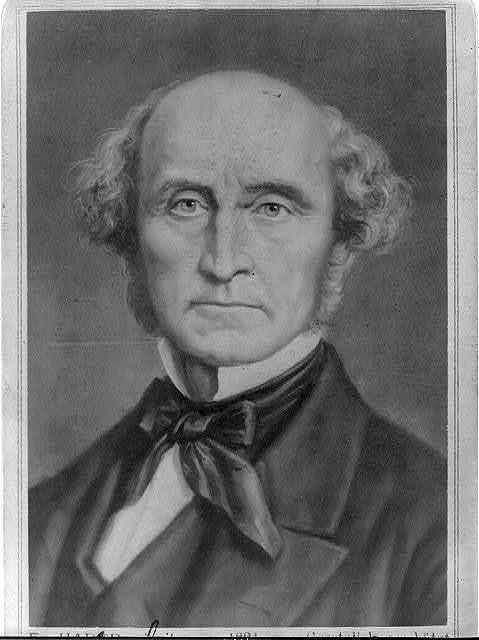How do we know what's right?
Warm-Up: The Trolley Problem
|
The Trolley Problem is probably the most famous thought experiment in all of philosophy. For a video introduction to it, watch this:
Quick Poll! Would you switch the track in the lever scenario? What about the pushing scenario?To cast your vote anonymously and see how others around the world voted, click here. |
Introduction
 John Stuart Mill (1806-1873) is considered the most influential English-speaking philosopher of the nineteenth century. He defended classical liberal ideals such as the freedom of individuals against absolute state power, and the importance of free speech and disagreement. In addition to being a philosopher, he was also a political economist and politician. A central theme throughout Mill's work is the notion that individuals should strive to improve the common good, bettering the lives of all people. Mill was a child prodigy, raised studying the tenets of utilitarianism with his father (James Mill) and the founder of the movement (Jeremy Bentham). Mill would build on these ideas to develop utilitarianism into the influential philosophical system it is today. In this class, we will be reading portions from Chapter 2 of Mill's book, On Utilitarianism. The book was written to explain utilitarianism and defend it against criticism. |
Links |
Key Concepts
|
Defining Utilitarianism
| Here is how Mill lays out the defining principle of utilitarianism: |
The doctrine that the basis of morals is utility or the greatest happiness principle, holds that actions are right in proportion as they tend to promote happiness, wrong in proportion as they tend to produce the reverse of happiness. By 'happiness' is meant pleasure and the absence of pain; by 'unhappiness' is meant pain and the lack of pleasure. To give a clear view of the moral standard set up by the theory, much more needs to be said, especially about what things the doctrine includes in the ideas of pain and pleasure, and to what extent it leaves this as an open question. But these supplementary explanations don’t affect the theory of life on which this theory of morality is based – namely the thesis that
pleasure and freedom from pain are the only things that are desirable as ends, and that everything that is desirable at all is so either for the pleasure inherent in it or as means to the promotion of pleasure and the prevention of pain.
Breaking Down the DefinitionSo Utilitarians believe actions are right insofar as they produce happiness and wrong insofar as they produce unhappiness or pain. Forget all this talk of Kantian rules or Aristotelian virtues, all that matters is pleasure and the absence of pain. Pleasure as the Only Value Utilitarians call the property in an object, action, or other activity that produces pleasure the object’s ‘utility’. Utilitarians want to maximize utility because they claim that pleasure (and freedom from pain) is the only thing that is desirable as an end in itself. They think that, for anything we want in life (a loving family, a nice car, a good job), if we really question why we want it, the answer will always be pleasure. Think about this in your own life. Why do you choose burritos for dinner rather than wheat bran? Why do you pay money for aspirin when you have a headache? We constantly look for trades that will increase pleasure and reduce suffering. |
What is Happiness?
Soma and the Meaning of Happiness
 In the classic work of literature, Aldous Huxley’s Brave New World, all members of society regularly use the drug 'soma.' Soma is a powerful, mind-altering pill that makes users feel blissful and carefree. In the words of the book, Soma produces “All the advantages of Christianity and alcohol; none of their defects" (From Chapter 3 of Brave New World) If Mill was simply saying the goal of human life is to maximize happiness, shouldn’t we all just take soma all the time? Is there any problem with living a life of pure and simple pleasure? Mill anticipated this challenge. He writes: |
Now, such a theory of life arouses utter dislike in many minds, including some that are among the most admirable in feeling and purpose. The view that life has (as they express it) no higher end —no better and nobler object of desire and pursuit— than pleasure they describe as utterly mean and grovelling, a doctrine worthy only of pigs. The followers of Epicurus were contemptuously compared with pigs, very early on, and modern holders of the utilitarian doctrine are occasionally subjected to equally polite comparisons by its German, French, and English opponents.
Epicurus and Hedonism
 |
Human vs. Beastly Pleasure
| In response to this objection, Mill puts forward the Epicurean response that is connected to their view of human nature, then builds their view into the utilitarian framework. |
When attacked in this way, the Epicureans have always answered that it is not they but their accusers who represent human nature in a degrading light, because the accusation implies that human beings are capable only of pleasures that pigs are also capable of. If this were true, there’d be no defence against the charge, but then it wouldn’t be a charge; for if the sources of pleasure were precisely the same for humans as for pigs, the rule of life that is good enough for them would be good enough for us. The comparison of the Epicurean life to that of beasts is felt as degrading precisely because a beast’s pleasures do not satisfy a human’s conceptions of happiness. Human beings have higher faculties than the animal appetites, and once they become conscious of them they don’t regard anything as happiness that doesn’t include their gratification…
In estimating the value of anything else, we take into account quality as well as quantity; it would be absurd if the value of pleasures were supposed to depend on quantity alone…
What counts as human happiness?
‘What do you mean by “difference of quality in pleasures”? What, according to you, makes one pleasure more valuable than another, merely as a pleasure, if not its being greater in amount?’ There is only one possible answer to this. Pleasure P1 is more desirable than pleasure P2 if: all or almost all people who have had experience of both give a decided preference to P1, irrespective of any feeling that they ought to prefer it. If those who are competently acquainted with both these pleasures place P1 so far above P2 that they prefer it even when they know that a greater amount of discontent will come with it, and wouldn’t give it up in exchange for any quantity of P2 that they are capable of having, we are justified in ascribing to P1 a superiority in quality that so greatly outweighs quantity as to make quantity comparatively negligible.
Now, it is an unquestionable fact that the way of life that employs the higher faculties is strongly preferred to the way of life that caters only to the lower ones by people who are equally acquainted with both and equally capable of appreciating and enjoying both. Few human creatures would agree to be changed into any of the lower animals in return for a promise of the fullest allowance of animal pleasures;

no intelligent human being would consent to be a fool, no educated person would prefer to be an ignoramus, no person of feeling and conscience would rather be selfish and base, even if they were convinced that the fool, the dunce or the rascal is better satisfied with his life than they are with theirs...If they ever think they would, it is only in cases of unhappiness so extreme that to escape from it they would exchange their situation for almost any other, however undesirable they may think the other to be. Someone with higher faculties requires more to make him happy, is probably capable of more acute suffering, and is certainly vulnerable to suffering at more points, than someone of an inferior type; but in spite of these drawbacks he can’t ever really wish to sink into what he feels to be a lower grade of existence.
But the most appropriate label is a sense of dignity. All human beings have this sense in one form or another, and how strongly a person has it is roughly proportional to how well endowed he is with the higher faculties. In those who have a strong sense of dignity, their dignity is so essential to their happiness that they couldn’t want, for more than a moment, anything that conflicts with it.
Anyone who thinks that this preference takes place at a sacrifice of happiness—anyone who denies that the superior being is, other things being anywhere near equal, happier than the inferior one—is confusing two very different ideas, those of happiness and of contentment. It is true of course that the being whose capacities of enjoyment are low has the greatest chance of having them fully satisfied and thus of being contented; and a highly endowed being will always feel that any happiness that he can look for, given how the world is, is imperfect. But he can learn to bear its imperfections, if they are at all bearable; and they won’t make him envy the person who isn’t conscious of the imperfections only because he has no sense of the good that those imperfections are imperfections of — for example, the person who isn’t bothered by the poor quality of the conducting because he doesn’t enjoy music anyway.
It is better to be a human being dissatisfied than a pig satisfied; better to be Socrates dissatisfied than a fool satisfied.
And if the fool or the pig think otherwise, that is because they know only their own side of the question. The other party to the comparison knows both sides
|
Mill argues here that human happiness is more than simply base pleasure – people with a strong sense of their own dignity and well-developed rational faculties will choose “higher” pleasures over “lower” ones every time, because they offer a deeper, more human happiness than mere contentment. Anyone who thinks otherwise, Mill says, only thinks that way because they haven’t properly experienced the happiness of the higher pleasures. Do you agree, or do you sometimes wish you were an animal who didn’t have to deal with human problems? If you agree with Mill, you might ask what exactly counts as a “higher” pleasure? In a word, anything that treats you like a human. Mill suggests these pleasures would cater to (1) our intelligence or reason, (2) our education or prior knowledge, (3) our feelings and moral conscience, and above all (4) our dignity. It’s tough to know exactly what is ruled out by this. It’s safe to say Shakespeare is on the higher side and mindless tiktoks are on the lower side. But are all tiktoks mindless? Do Marvel movies treat their audiences with dignity? What about watching or playing sports? The answer likely depends not just on the structure of the activities themselves but also how you are interacting with these platforms and activities. |
Greatest Happiness and Equal Consideration
|
If Mill stopped here, at a deeper meaning of individual happiness, he would simply be an Epicurean, a hedonist seeking to maximize deep, individual happiness. But to this view Mill adds consideration for other people’s happiness via the “greatest happiness principle” and “principle of equal consideration.” The greatest happiness principle (GHP) holds that we should pursue actions that produce the greatest amount of overall happiness in the world, not just maximize our own happiness. Crucially, utilitarians think we must take into account the utility of everyone affected by a given decision, and give no special consideration to any individual or group, including ourselves. This is known as the Principle of Equal Consideration (PEC). Mill also argues that we ought to organize our society in such a way that actions that promote an individual’s happiness are aligned with the happiness of the group as a whole. |
But this great moral duty rests on a still deeper foundation, being a direct upshot of the first principle of morals, and not a mere logical inference from secondary or derivative doctrines. It is involved in the very meaning of utility, or the greatest happiness principle. That principle is a mere form of words with no intelligible meaning unless one person’s happiness counts for exactly as much as another’s (assuming that they are equal in degree, and with the proper allowance made for differences in kinds of happiness — [see our section on ‘What is Happiness’]). Bentham’s dictum, ‘everybody to count for one, nobody for more than one’ might be written under the principle of utility as an explanatory commentary…
The happiness that forms the utilitarian standard of what is right in conduct is not the agent’s own happiness but that of all concerned. As between his own happiness and that of others, utilitarianism requires him to be as strictly impartial as a disinterested and benevolent spectator. In the golden rule of Jesus of Nazareth we read the complete spirit of the ethics of utility. To do as you would be done by, and to love your neighbour as yourself constitute the ideal perfection of utilitarian morality. As the practical way to get as close as possible to this ideal, the ethics of utility would command two things. (1) First, laws and social arrangements should place the happiness (or what for practical purposes we may call the interest) of every individual as much as possible in harmony with the interest of the whole. (2) Education and opinion, which have such a vast power over human character, should use that power to establish in the mind of every individual an unbreakable link between his own happiness and the good of the whole; especially between his own happiness and the kinds of conduct (whether doing or allowing) that are conducive to universal happiness. If (2) is done properly, it will tend to have two results: (2a) The individual won’t be able to conceive the possibility of being personally happy while acting in ways opposed to the general good. (2b) In each individual a direct impulse to promote the general good will be one of the habitual motives of action, and the feelings connected with it will fill a large and prominent place in his sentient existence. This is the true character of the utilitarian morality. If those who attack utilitarianism see it as being like this, I don’t know what good features of some other moralities they could possibly say that utilitarianism lacks, what more beautiful or more elevated developments of human nature any other ethical systems can be supposed to encourage, or what motivations for action that aren’t available to the utilitarian those other systems rely on for giving effect to their mandates
Disinterested
Here, and everywhere Mill uses it, ‘disinterested’ doesn't mean bored or unimportant. It means not self-interested; not swayed by any consideration of how the outcome might affect one’s own welfare. This is how most philosophers use this word.
Who is in Your Moral Circle?
|
So utilitarians believe we should consider everyone’s happiness equally when trying to maximize happiness. This might lead one to ask who counts as “everyone” in the GHP? Utilitarians think everything that experiences pleasure or pain should have its interests count when determining what to do. Sentience is the capacity of a creature to experience utility, pleasure and pain. People are sentient, as are most animals. Crucially, different creatures (even different individuals) might have more or less of a capacity to experience pain or pleasure. Sentience can come in degrees. Even individual people or animals might be more or less capable of experiencing levels of utility based on their experiences. So Bentham’s dictum of “Everyone to count for one” turns out to be a bit muddier than he makes it seem. The implications of using sentience as the criterion for moral worth are serious, and varied. Many utilitarians become vegetarian due to all the unnecessary cruelty inflicted on factory farmed animals. The most famous utilitarian alive today, Peter Singer, spends much of his time advocating for animal rights. But while sentience can be used to open the door for animals into our moral circle, it can also be used to shut the door, blocking certain groups out of the circle. For example, many women are not given adequate medical treatment in part because doctors assume their pain isn’t serious (See this article and this study). This is particularly a problem for women of color, who, in addition to the bias of belittling female pain, have added cultural norms against showing weakness and a cultural prejudice of white people to dehumanize them and refuse to acknowledge their pain (see these stats and this article). These problems were especially common in Mill’s day, but, as these articles show, they are still prevalent today. |

Biased Approaches to Utilitarian Math
 This leads us to wider consideration of biased approaches to the “felicific calculus,” as utilitarianism’s founder Jeremy Bentham called it. For utilitarians, determining the right thing to do is a matter of adding up the potential utility an action will produce for the sentient creatures affected. Because of its simplicity and (supposed) reduction of complex moral problems to objective, measurable data points, utilitarianism has been a popular choice of Western governments, especially militaristic ones seeking to justify their violent ‘means’ by pointing to their good ‘ends.’ But two persistent problems for “felicific calculus” are (1) the difficulty humans have shedding their biases when making calculations and (2) the difficulty of predicting the consequences of our actions. At this point you are probably familiar with the concept of unconscious bias and its role in human decision-making, so we won’t expand on it here. Suffice to say, our calculations may seem disinterested and unbiased when really our prior experiences and natural instincts are lurking beneath the surface. And while the future is predictable in some ways, to what extent can we be held accountable for consequences that we could not have reasonably anticipated and included in our felicific calculus? Climatologists have been pointing to human-caused climate change since at least the 70s, so should every government after that be held accountable for not taking mitigating action against it? What about the governments before that science came out? Should we not take any actions at all until all possible outcomes can be reliably measured and weighed against each other? In addition to biased results that appear objective, Utilitarianism can leave you in an endless calculation hole. |
Three Objections
1. Utilitarianism is too high a burden.
| Throughout the chapter, Mill explains and answers some of the most common arguments against his theory. We have put a few of them here for ease of access to the objection and Mill's response. |
Objectors who have anything like a correct idea of its disinterested character sometimes find fault with utilitarianism’s standard as being too high for humanity. To require people always to act from the motive of promoting the general interests of society—that is demanding too much, they say.
Mill’s Response
But this is to mistake the very meaning of a standard of morals, and confuse the rule of action with the motive for acting. It is the business of ethics to tell us what are our duties, or by what test we can know them; but no system of ethics requires that our only motive in everything we do shall be a feeling of duty; on the contrary, ninety-nine hundredths of all our actions are done from other motives, and rightly so if the rule of duty doesn’t condemn them. It is especially unfair to utilitarianism to object to it on the basis of this particular misunderstanding, because utilitarian moralists have gone beyond almost everyone in asserting that the motive has nothing to do with the morality of the action though it has much to do with the worth of the agent. He who saves a fellow creature from drowning does what is morally right, whether his motive is duty or the hope of being paid for his trouble; he who betrays a friend who trusts him is guilty of a crime, even if his aim is to serve another friend to whom he is under greater obligations.
|
Here we see just how different Mill’s utilitarianism is from Kant’s deontology. For Kant, you are immoral if you do the right thing but for the wrong reasons – the motive is what matters, not the outcome. Nevertheless, Mill does acknowledge that utilitarianism still takes a tremendous amount of self-sacrifice: |
Only while the world is in a very imperfect state can it happen that anyone’s best chance of serving the happiness of others is through the absolute sacrifice of his own happiness; but while the world is in that imperfect state, I fully admit that the readiness to make such a sacrifice is the highest virtue that can be found in man. I would add something that may seem paradoxical: namely that in this present imperfect condition of the world the conscious ability to do without happiness gives the best prospect of bringing about such happiness as is attainable. For nothing except that consciousness can raise a person above the chances of life by making him feel that fate and fortune—let them do their worst!—have no power to subdue him. Once he feels that, it frees him from excessive anxiety about the evils of life and lets him calmly develop the sources of satisfaction that are available to him, not concerning himself with the uncertainty regarding how long they will last or the certainty that they will end.
|
This line of thinking, while Mill describes it as liberating, can actually be debilitating if taken to the extreme. People have been known to become “happiness pumps” based on this logic, completely forgoing their happiness in order to best promote the happiness of others. To see an example of this, check out this clip from the award-winning sitcom The Good Place.
|
2. Doing all this calculating takes too much time.
‘Before acting, one doesn’t have time to calculate and weigh the effects on the general happiness of any line of conduct.’
Mill’s Response
This is just like saying: ‘Before acting, one doesn’t have time on each occasion to read through the Old and New Testaments; so it is impossible for us to guide our conduct by Christianity.’ The answer to the objection is that there has been plenty of time, namely, the whole past duration of the human species. During all that time, mankind has been learning by experience what sorts of consequences actions are apt to have, this being something on which all the morality of life depends, as well as all the prudence [= ‘decisions about what will further one’s own interests’]. The objectors talk as if the start of this course of experience had been put off until now, so that when some man feels tempted to meddle with the property or life of someone else he has to start at that moment considering for the first time whether murder and theft are harmful to human happiness! Even if that were how things stand, I don’t think he would find the question very puzzling...
If mankind were agreed in considering utility to be the test of morality, they would of course—it would be merely fanciful to deny it—reach some agreement about what is useful, and would arrange for their notions about this to be taught to the young and enforced by law and opinion. Any ethical standard whatever can easily be ‘shown’ to work badly if we suppose universal idiocy to be conjoined with it! But on any hypothesis short of that, mankind must by this time have acquired positive beliefs as to the effects of some actions on their happiness; and the beliefs that have thus come down to us from the experience of mankind are the rules of morality for the people in general—and for the philosopher until he succeeds in finding something better. The corollaries from the principle of utility, like the rules of every practical art, can be improved indefinitely, and while the human mind is progressing they are constantly improving.
3. We're too naturally selfish
We are told that a utilitarian will be apt to make his own particular case an exception to moral rules; and that when he is tempted to do something wrong he will see more utility in doing it than in not doing it.
Mill’s Response
But is utility the only morality that can provide us with excuses for evil doing, and means of cheating our own conscience? Of course not! Such excuses are provided in abundance by all doctrines that recognise the existence of conflicting considerations as a fact in morals; and this is recognized by every doctrine that any sane person has believed. It is the fault not of any creed but of the complicated nature of human affairs that rules of conduct can’t be formulated so that they require no exceptions, and hardly any kind of action can safely be stated to be either always obligatory or always condemnable.
Every ethical creed softens the rigidity of its laws by giving the morally responsible agent some freedom to adapt his behaviour to special features of his circumstances; and under every creed, at the opening thus made, self-deception and dishonest reasoning get in. Every moral system allows for clear cases of conflicting obligation. These are real difficulties, knotty points both in the theory of ethics and in the practical personal matter of living conscientiously. If utility is the basic source of moral obligations, utility can be invoked to decide between obligations whose demands are incompatible. The utility standard may be hard to apply, but it is better than having no standard. In other systems, the moral laws all claim independent authority, so that there’s no common umpire entitled to settle conflicts between them; when one of them is claimed to have precedence over another, the basis for this is little better than sophistry, allowing free scope for personal desires and preferences (unless the conflict is resolved by the unadmitted influence of considerations of utility). It is only in these cases of conflict between secondary principles that there is any need to appeal to first principles. In every case of moral obligation some secondary principle is involved; and if there is only one, someone who recognizes that principle can seldom be in any real doubt as to which one it is.
Return to the Trolley Problem
|
Now let’s return to the Trolley Problem with which we started this essay – What sorts of real life Trolley Problems do we face when trying to make moral decisions? When we put the Trolley Problem into the real world, is it as easy to make the calculated, utilitarian choice? To make the problem more real, here’s the philosophy consultant from The Good Place talking through a few clips from the show’s take on the Trolley Problem.
|
Acknowledgements
This digital essay was prepared by Blake Ziegler from the University of Notre Dame, and edited by Sam Kennedy.
Ziegler, Blake. 2022. "J.S. Mill's Utilitarianism: Promote the Most Happiness." The Notre Dame Philosophy Commons. Sam Kennedy (ed.).